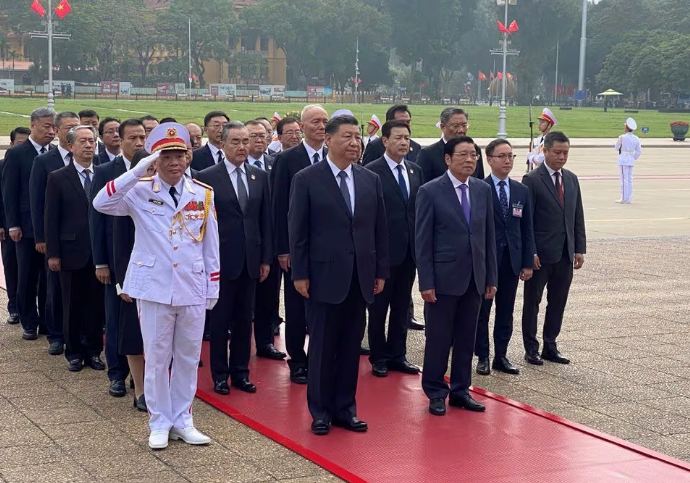China and Vietnam agreed to step up co-operation on security matters in their move towards becoming a community with a “shared future”, they said on Wednesday, as Chinese President Xi Jinping wrapped up a visit to Hanoi.
On Xi’s two-day trip, the Communist-ruled neighbours, close in economic areas but at odds over boundaries in the South China Sea, signed dozens of co-operation pacts and agreed to set up more hotlines to defuse any emergencies in the contested waters.
In a 16-page joint statement, the countries, which share a millennia-long history of conflict, vowed to work more closely to strengthen defence industry ties and intelligence exchanges.
They said their aim was partly to avert the risk of what they called a “colour revolution” promoted by hostile forces, using a term for popular uprisings that have shaken former Communist nations.
They “announced the establishment of a strategic China-Vietnam community of ‘shared future’ to promote the upgrading of China-Vietnam relations,” Xi told the chairman of Vietnam’s parliament, Vuong Dinh Hue, at a meeting earlier.
The decision was a historic milestone, and joining such a community was a “strategic” choice, Prime Minister Pham Minh Chinh said when he met Xi, who was making his first visit this year to an Asian nation.
The warm comments followed months of talks on how best to describe ties. In Chinese, the “shared future” phrasing uses a word meaning “destiny”, but is translated in Vietnamese and English as the more prosaic “future”.
Xi has pushed hard for the upgrade in ties, especially after Vietnam elevated the United States in September to the highest tier of its diplomatic ranking, the same as China’s.
As China and the United States vie for influence in the strategic nation, the pacts mark an achievement for Vietnam’s “Bamboo” diplomacy, although analysts and diplomats said the improvement in relations could be more symbolic than real.
Xi’s visit to Vietnam, which is home to a growing number of Chinese manufacturers, is only his fourth overseas this year after trips to Russia, South Africa and the United States.
FOCUS ON DATA, RARE EARTHS
The pacts signed cover possible investments in rail links and security, as well as three on telecoms and “digital data co-operation”, a list from Vietnamese authorities showed.
Details of the deals have not been revealed, but experts and diplomats said digital economy pacts could pave the way for Chinese support to build a 5G network in Vietnam and investments in undersea infrastructure.
The deals reflect the interests of both sides, said Hung Nguyen, a specialist in supply chain issues at RMIT University Vietnam, as China has recently built an undersea data centre off its southern island of Hainan, while Vietnam wants to develop its infrastructure.
Key targets for investment could be areas such as telecoms infrastructure, satellite ground tracking stations and data centres, he added.
But some significant items were missing from the lengthy list of deals.
No pact was unveiled on rare earths, for example, although Xi, in an article in a Vietnamese state newspaper, urged broader co-operation on critical minerals. In the joint statement both agreed to seek ways to co-operate on key minerals, however.
Vietnam is estimated to have the world’s second largest deposits of rare earths after China, with its biggest mines located in an area where the rail network is set to benefit from this week’s deals.
China dominates the supply of the minerals crucial for electric vehicles and wind turbines, and is usually loath to share its technology.
Vietnam has strict rules on the export of rare earth ores, which it wants to process at home, but often lacks the technology to do so.
To boost trade and investment, both agreed to set up a zone focusing on farming, infrastructure, energy, digital economy and green development, the statement said.
Plans for special economic zones to boost investment had to be shelved after they sparked protests in 2018 by Vietnamese who feared the move could favour Chinese firms.

































